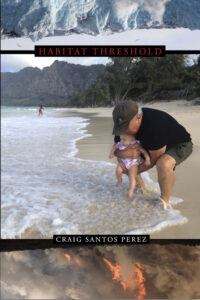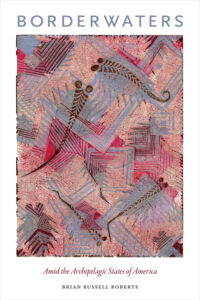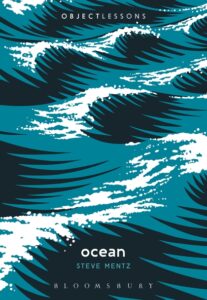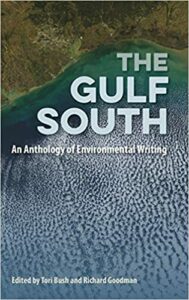This episode was recorded on Friday, April 16, 2021
Co-Hosts: Bethany Wiggin, Melody Jue
Featured Guests/Works:
The ocean comprises the largest object on our planet. Retelling human history from an oceanic rather than terrestrial point of view unsettles our relationship with the more than human world. Human engagements with the world’s ocean can be destructive, as with today’s deluges of plastic trash and acidification, but the mismatch between small bodies and vast seas also emphasizes the frailty and resilience of human experience. From ancient stories of shipwrecked sailors to the containerized future of twenty-first century commerce, Ocean splashes the histories we thought we knew into  salty and unfamiliar places.
salty and unfamiliar places.
Steve Mentz is Professor of English at St. John’s University in New York City. His most recent books are Ocean (2020), Break Up the Anthropocene (2019), and Shipwreck Modernity (2015).
 Craig Santos Perez, Habitat Threshhold
Craig Santos Perez, Habitat Threshhold
With Habitat Threshhold, Craig Santos Perez has crafted a timely collection of eco-poetry that explores his ancestry as a native Pacific Islander, the ecological plight of his homeland, and his fears for the future. The book begins with the birth of the author’s daughter, capturing her growth and childlike awe at the wonders of nature. As it progresses, Perez confronts the impacts of environmental injustice, the ravages of global capitalism, toxic waste, animal extinction, water rights, human violence, mass migration, and climate change. Throughout, he mourns lost habitats and species, and confronts his fears for the future world his daughter will inherit. Amid meditations on calamity, this work does not stop at the threshold of elegy. Instead, the poet envisions a sustainable future in which our ethics are shaped by the indigenous belief that the earth is sacred and all beings are interconnected—a  future in which we cultivate love and “carry each other towards the horizon of care.”
future in which we cultivate love and “carry each other towards the horizon of care.”
Craig Santos Perez is an indigenous Chamoru poet from the Pacific Island of Guåhan (Guam). He is the author of five books of poetry, and a professor in the English department at the University of Hawai’i, Mānoa.
 Brian Russell Roberts, Borderwaters: Amid the Archipelagic States of America
Brian Russell Roberts, Borderwaters: Amid the Archipelagic States of America
Conventional narratives describe the United States as a continental country bordered by Canada and Mexico. Yet, since the late twentieth century the United States has claimed more water space than land space, and more water space than perhaps any other country in the world. This watery version of the United States borders some twenty-one countries, particularly in the archipelagoes of the Pacific and the Caribbean. In Borderwaters Brian Russell Roberts dispels continental national mythologies to advance an alternative image of the United States as an archipelagic nation. Drawing on literature, visual art, and other expressive forms that range from short stories about the afterlife of single-use plastic to Indigenous testimonies against nuclear testing, Roberts remaps both the fundamentals of US geography and the foundations of how we discuss US culture.
 Brian Russell Roberts is Professor of English and Director of American Studies at Brigham Young University. In addition to Borderwaters, his recent publications include the coedited collections Archipelagic American Studies (2017, with Michelle Ann Stephens) and Indonesian Notebook: A Sourcebook on Richard Wright and the Bandung Conference (2016, with Keith Foulcher).
Brian Russell Roberts is Professor of English and Director of American Studies at Brigham Young University. In addition to Borderwaters, his recent publications include the coedited collections Archipelagic American Studies (2017, with Michelle Ann Stephens) and Indonesian Notebook: A Sourcebook on Richard Wright and the Bandung Conference (2016, with Keith Foulcher).
Tori Bush, The Gulf South: An Anthology of Environmental Writing
The first collection of environmental writing about the Gulf South region, this volume features a diverse array of voices from the past 100 years. The work of these writers and artists enriches how we understand and represent the relationship between people and the rapidly changing ecology of the Gulf. Reaching from Texas to Florida, this anthology presents pieces from a variety of genres, from journalism to poetry to memoir to a graphic nonfiction book. The subjects include natural and human-made disasters, the impact of industry, influential historical events, personal encounters with the environment, and a deep love for the land and water by the people who live there. Reflecting a range of different landscapes and their inhabitants, and emphasizing the human voice and condition throughout, The Gulf South: An Anthology of Environmental Writing brings to light a region whose influence on American commerce and culture reaches far beyond its geographical boundaries. This volume encourages readers to consider how we choose to characterize the environment and its degradation through language, and how these accounts affect our thinking and planning for the future.
 Tori Bush is a PhD Candidate and instructor at Louisiana State University. Her dissertation “Eco-Orientalism: Constructing Climate Migration” is an interdisciplinary investigation into how the very small island of Isle de Jean Charles has been constructed through a white western lens of literature, media, and other cultural objects as an environmental sacrifice zone, or “eco-orientalized,” in order to experiment with processes and procedure of climate migration in the United States.
Tori Bush is a PhD Candidate and instructor at Louisiana State University. Her dissertation “Eco-Orientalism: Constructing Climate Migration” is an interdisciplinary investigation into how the very small island of Isle de Jean Charles has been constructed through a white western lens of literature, media, and other cultural objects as an environmental sacrifice zone, or “eco-orientalized,” in order to experiment with processes and procedure of climate migration in the United States.


